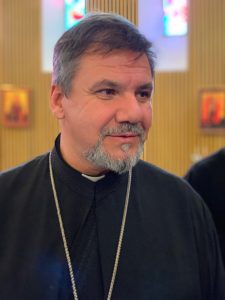Abstract: Charismatic experiences signal God’s presence in the midst of the believers. One such experience has its first documentary record in Luke 24:32. According to the evangelist, the disciples realised that, while the Lord was with them, their hearts were burning. The sceptics might take this reference as an empty metaphor. But for the philokalic tradition and literary antecedents such as the fourth-century Spiritual Homilies, the metaphor is not empty. Hearts do burn in the Lord’s presence, as a prelude to glorification. In this talk I focus on select passages from throughout The Philokalia which describe this charism. These passages, I propose, map and authenticate an experience which is not infrequent today.
Expanding on the topic: Faith is the beginning of our spiritual journey, but one does not know God through faith; indeed, one does not reach the end of the journey by faith alone. Faith gives an idea of God and the meaning of our lives, based on scriptural and traditional grounds. But to know God and thus attain the fullness of life is a matter of experiencing the divine presence. The two disciples traveling to Emaus had a taste of what that might mean: their hearts were burning in the Lord’s presence. This experience filled them with certainty. As Saint Diadochus of Photiki noted, “All God’s gifts of grace are flawless and the source of everything good; but the gift which inflames our heart and moves it to the love of His goodness more than any other is theology… it embraces our intellect with the light of a transforming fire…” (On Spiritual Knowledge 67; in The Philokalia, vol. 1, p. 275).
Various authors whose works are included in The Philokalia discuss this experiential way of knowing God. They all agree that this charismatically signalled fellowship with God is an intimate, direct way of knowing, and thus a much better proof of God than faith and logic could produce. And although it is not typical for the Orthodox to boast about their charismatic experiences, the truth is that these are well documented in trustworthy sources. The Philokalia is but a summary of an otherwise rich literature on this and related topics. What matters is that the believers who experience this charism get to know the living God beyond faith and basic catechism.
Some believers might feel disheartened for not having an experience such as the heart’s warmth. This realisation, however, should lead them to further hope and sustained effort on the path of their spiritual renewal. The sources I discuss in this talk point out that the divine warmth does not occur without faith and the purity of one’s heart. Evil thoughts such as envy, hatred, self-importance and selfishness make any charismatic experiences impossible. Well, a selfish and vile person might perform miracles (see Matthew 7:21-23), but in God’s eyes the only miracle that matters is taming one’s own heart. As the Lord teaches, “blessed are the pure in heart, for they shall see God” (Matthew 5:8).
Once the believers proceed to change their lives, Christ’s Holy Spirit gives them signs and incentives to keep doing so. The burning heart is one such incentive. It is true that personal progress does not warrant charismatic experiences, but sometimes—as the Spirit wishes—it does. We cannot twist God’s arm, as it were, to get a gift. Some attempt to do so by fasting or by repeating the Jesus-Prayer as though they are at some sport competition. “God opposes the proud, but gives grace to the humble” (James 4:6). When gifts occur, people should respond with humble gratitude, continuing to work towards earning what they received. What matters is for believers to find joy and encouragement both in the hope of being granted such a gift at some point, and in knowing that fellow believers already received this blessing. Either way, the living God is not far from any of the kingdom’s children. God’s many gifts reveal the Lord personally and fulfil our lives.
Elsewhere I referred to the gift of the burning heart and other charismatic experiences in a more or less veiled way. You might want to watch those lectures (particularly the fourth one), available via this link: https://aiocs.net/category/shortcourses/ They will provide you with a solid background in matters of knowing God. There you will learn that receiving gifts is not the end of it; we must always test our experience against the criteria of our tradition. Above all, we must humble ourselves before the Lord and all people.
Video recording of the talk (credit: Otilia Costache)
Event page. See also Father Geoff Harvey’s report on the event.
Exploring Orthodoxy 2019 on Ancient Faith Ministries.
27 August 2019 © AIOCS

